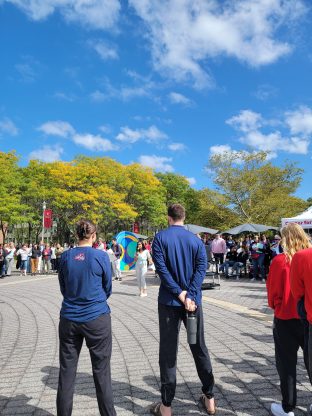
The Center for Prevention and Outreach hosted its sixth annual Walk of Hope for Suicide Prevention Awareness Month on Wednesday, Sept. 27.
September is Suicide Prevention Awareness Month, and Stony Brook University’s Center for Prevention and Outreach (CPO) hosted a Walk of Hope to spread awareness of mental health struggles and open up the conversation surrounding suicide prevention.
Hundreds of students, faculty and members of the Stony Brook community came out to the Student Activities Center Plaza to join the walk and show their support by chanting, “Speak up. Reach out. You are not alone.”
According to Melissa Woody, the Collegiate Outreach Coordinator for CPO and a licensed social worker, Stony Brook University has always been passionate about advocating for suicide prevention. Woody emphasized that the university wants to make sure students know they are not alone and that the campus offers numerous resources.
“Reach[ing] out, it’s actually a sign of strength. It’s not a sign of weakness,” Woody said. “Once you know yourself, you’re able to reach out. So it’s really important that students know that they’re not alone, and to reach out when they need it.”
Stony Brook University has many resources for students who are in need of help and someone to talk to. For instance, CPO offers numerous drop-in spaces for students to connect with one another.
Counseling and Psychological Services (CAPS) offers counseling to students in person and virtually. They also have a program for commuter students who may not have time to come to CAPS for an appointment which can help find a health provider in the student’s area.
TimelyCare is a telehealth platform that offers 24/7 mental and physical health availability to counselors and licensed professionals. The student support team is a great place to start for students who are unsure of who to go to.
“There’s so much happening [when] your brain is developing, your identity is developing, it could be the first time you’re away from family and people, you know, and it can be isolating,” Woody said.
Being a part of this community and helping spread awareness for suicide prevention is important to Woody. Suicide is the second-leading cause of death among college students. Therefore, Woody stresses how important it is for her and her colleagues to continue advocating and supporting students who are struggling mentally.
“That’s the message that we really want to send that we are with our students — that we love our students, and that we’re here for them, not only in the counseling center, but also out in the community with them,” Danielle Benitez, a graduate student and Operations Associate for CAPS, said.
Benitez expressed how this event was a priority for all of the CAPS staff. Suicide prevention is a part of their daily work, and they wanted the students to know how important this cause is to them.
“It’s really important in making sure that each and every individual in this college community feels like they have community support and make sure that you’re not feeling alone in what you’re struggling [with],” Aimee Wadolowski, a sophomore psychology major and mental health peer educator for CPO, said.
According to Wadolowski, events like the Walk of Hope are great ways to show students that they are not alone and have a community that cares about them. She explained that college can be stressful, so having community support is essential in helping college students feel like they are not alone.
Several clubs and offices had tables set up to hand out pamphlets, pins and beaded necklaces to show their support for Suicide Prevention Month.
The CPO had a table where some of their peer educators handed out beaded necklaces, pins and keychains. Maggie Wang, a sophomore psychology major and peer educator for CPO, said that the colors of the pins and keychains represented different methods of support for suicide prevention.
Although September is Suicide Prevention Month, it’s important for students to continue advocating for mental health awareness. According to Woody, some ways to continue advocating are by speaking out about jokes that mention suicide and educating our peers on why it’s not okay to use that language, showing up to campus or community events that are advocating for suicide prevention and mental health awareness and being kind to one another.
“This event is kind of like to amplify that we do care and that it is important, and that you do have people that care about you, [and] even if I may not know you, I care about you and your life is important,” Benitez said.








